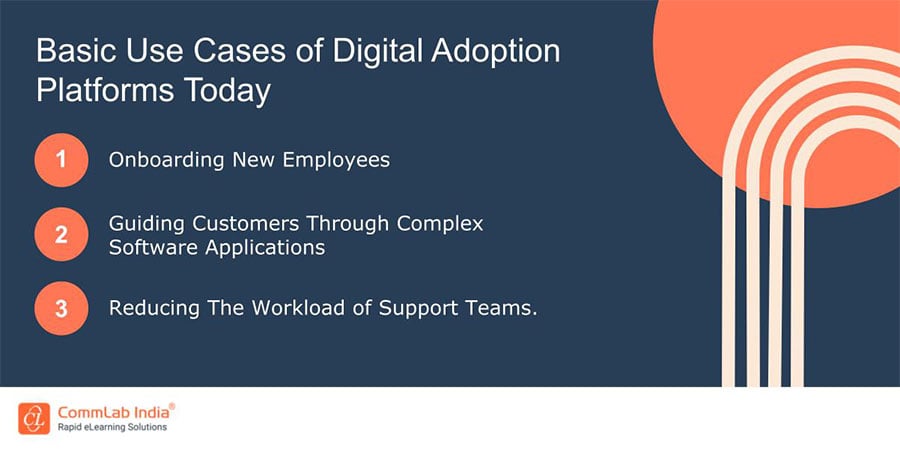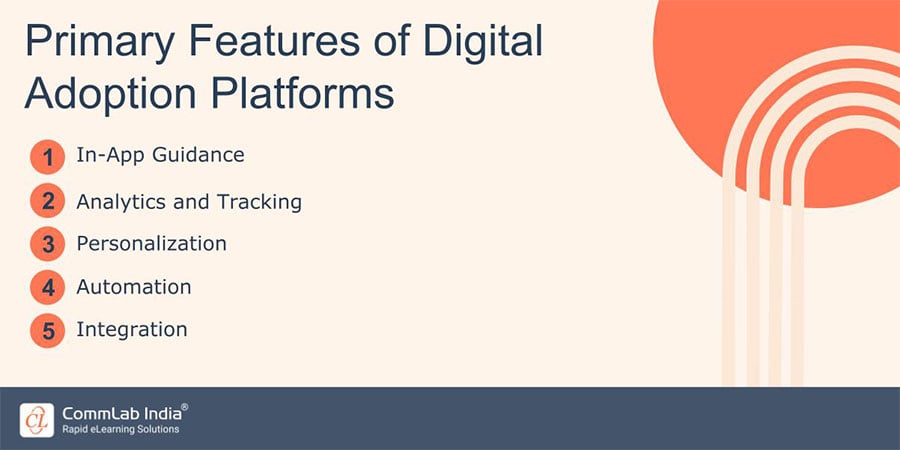Digital Adoption Platforms: The Sidekick Your Software Training Needs

Have you ever been so frustrated with a new software that you feel like throwing your computer out the window? Or maybe you’ve spent hours in a training session, only to forget everything as soon as you start using the tool? Fear not, because digital adoption platforms (DAPs) are here to save the day! These superhero software solutions offer in-app guidance, personalization, automation, and more, all aimed at making your software experience a breeze. Say goodbye to traditional training methods and hello to the digital age of learning. In this article, we will explore what digital adoption platforms are, how they help with software training, and introduce you to 5 popular DAPs and their primary features.
Tired of Wasting Your Valuable Hours on Software Training? Try Digital Adoption Platforms!
Here are 5 popular tools to help you out:
- WalkMe
- Whatfix
- Pendo
- Apty
- Appcues
Read on to understand how they help with software training.
What are Digital Adoption Platforms (DAPs)?
So, what are DAPs? They’re like Batman’s utility belt, but for software training. They offer a range of features to help users understand and navigate through digital tools more efficiently, improving the overall user experience. Think of them as the Robin to your Batman, but without the cringe-worthy one-liners.
Digital adoption platforms are software solutions designed to help organizations improve the adoption of digital tools and technology among their employees and customers. DAPs typically offer a variety of features, such as in-app guidance, analytics and tracking, personalization, automation, and integration with other digital tools and systems. These platforms are designed to help users understand and navigate through digital tools more efficiently, and improve the overall user experience.
→ Download eBook Now: eLearning Trends 2023
How can Digital Adoption Platforms Help with Software Training?
As we all know, software training can be a daunting task, especially if it involves learning new tools and features. Many traditional training methods, such as classroom training, one-on-one mentoring, and conventional eLearning are often ineffective because they don’t provide enough practical experience or real-time guidance. That’s where DAPs come in – they offer a more personalized and interactive approach to software training.
But how do these digital sidekicks help with software training? Well, imagine having Alfred, the trusted butler of Bruce Wayne, as your personal software trainer. DAPs provide real-time, contextual guidance to users, helping them complete tasks quickly and efficiently. This saves time and money, and even better, prevents you from ending up in Arkham Asylum.
Digital adoption platforms can also help identify areas of improvement and optimize the user experience, resulting in increased productivity and user satisfaction. DAPs help with software training by providing in-app guidance that is contextual and real-time. This means that as you navigate through a software application, a DAP will provide helpful tips and suggestions based on the task you are currently working on. For example, if you are filling out a form in a new software tool, a DAP might pop up and suggest how to complete the form more efficiently.

Benefits of Using Digital Adoption Platforms for Software Training
1. Offers customization, automation, and analytics
In addition to in-app guidance, DAPs offer other features that can help with software training. For example, many DAPs allow for customization so that businesses can tailor the user experience to their specific needs. They also offer automation and analytics, which can help track user progress and identify areas for improvement. By providing personalized and relevant training, DAPs can help users become proficient in software tools much more quickly and effectively than traditional training methods.
2. Promotes experiential learning
One of the main benefits of DAPs is that they allow users to enjoy experiential learning i.e. learn by doing. Instead of simply listening to lectures or watching videos, users are actively engaging with software tools in real time. This provides a more practical and memorable learning experience, which can lead to higher retention rates and more successful software usage.
3. Provides learning on-demand
Another benefit of DAPs is that they are available on-demand, meaning that users can access training materials whenever they need them. This is particularly useful for companies that have a hybrid workforce or for those who work outside of traditional office hours. By providing flexible and accessible training, DAPs can help businesses save time and money on traditional training methods.

5 Popular Digital Adoption Platforms in 2023
1. WalkMe
WalkMe is a digital adoption platform that provides in-app guidance, automation, and analytics to help businesses increase software adoption and usage. One of WalkMe’s unique features is its Smart Walk-Thrus, which are interactive, step-by-step guides that help users complete tasks within an application. WalkMe also offers a wide range of customization options, allowing businesses to tailor the user experience to their specific needs.
2. Whatfix
Whatfix is one of the most popular platforms today and one of its unique features is its Self-Help widget, which provides users with instant access to contextual help and support within an application. Whatfix also offers content creation and management tools, making it easy for businesses to create and publish their own in-app guidance. It also integrates with popular learning management systems, like Moodle and Blackboard.

eLearning Trends for 2024
Seal the Deal with Success
- Training Formats for Upskilling and Reskilling
- Popular AI Tools for L&D
- Mastering the New-Age Learning Formats
- And More!
3. Pendo
Pendo is a digital adoption platform that offers in-app guidance, analytics, and feedback tools to help businesses improve software adoption and user engagement. Pendo’s unique feature is its Product Engagement Score, which measures how engaged users are with a software application. It also offers in-app surveys and feedback tools, making it easy for businesses to collect user feedback and incorporate it into their product development cycle.
4. Apty
Apty is another great and reliable platform for digital adoption and its Process Intelligence technology, can analyze user behavior within an application and provides personalized guidance based on that behavior. Apty also offers automation tools, such as task automation and data entry automation, to help users complete tasks more quickly and efficiently.
5. Appcues
Appcues is a digital adoption platform that offers in-app guidance, analytics, and customization tools to help businesses improve software adoption and user engagement. Appcues’ unique feature is its Visual Builder, which allows businesses to create and publish in-app guidance and messages without any coding or technical knowledge. Appcues also offers segmentation and personalization tools, making it easy for businesses to provide targeted and relevant guidance to users.
Wrapping Up!
Digital Adoption Platforms (DAPs) are a valuable tool for software training because they provide personalized and interactive guidance that is relevant to the task at hand. By offering in-app guidance, customization, automation, and analytics. They offer a practical and memorable learning experience that can help businesses save time and money while improving user productivity and satisfaction. Just like DAPs have been one of the many popular trends in eLearning, there are other equally impactful trends to explore. If you wish to dive deep into discovering these trends, you can get started by checking out our insightful eBook. Grab your copy now!





